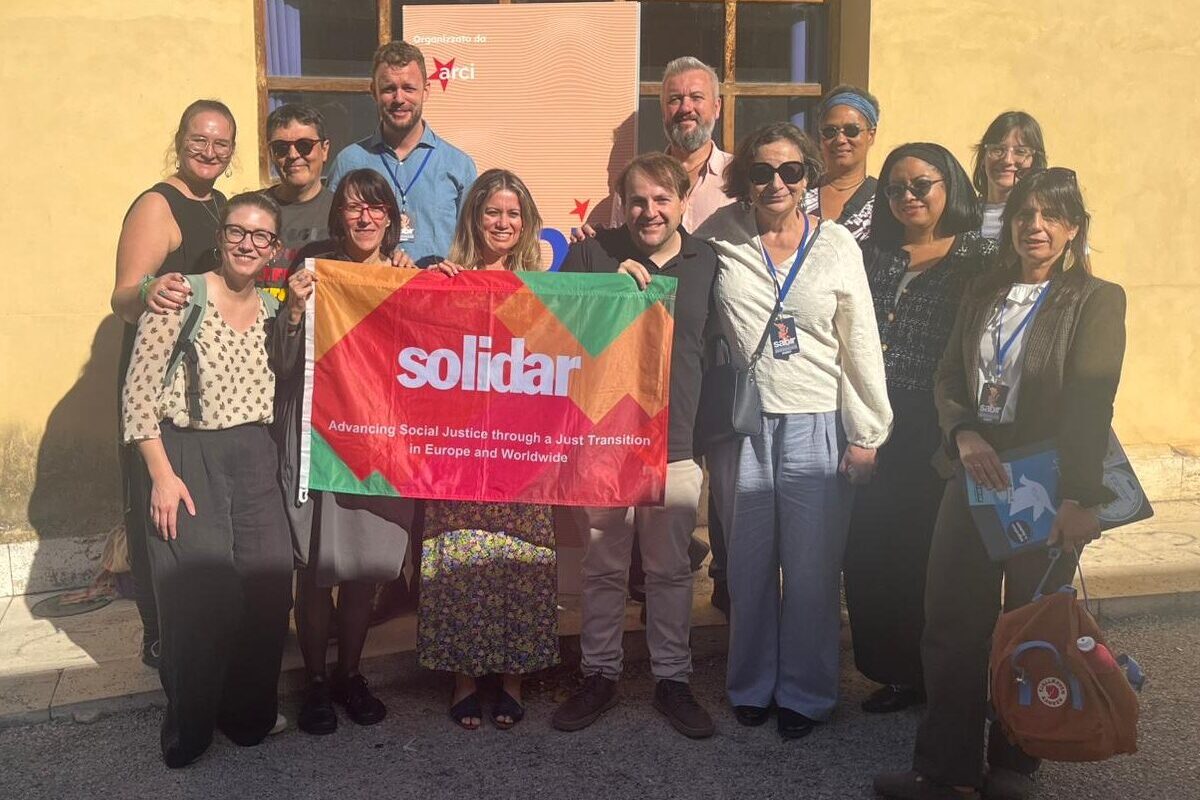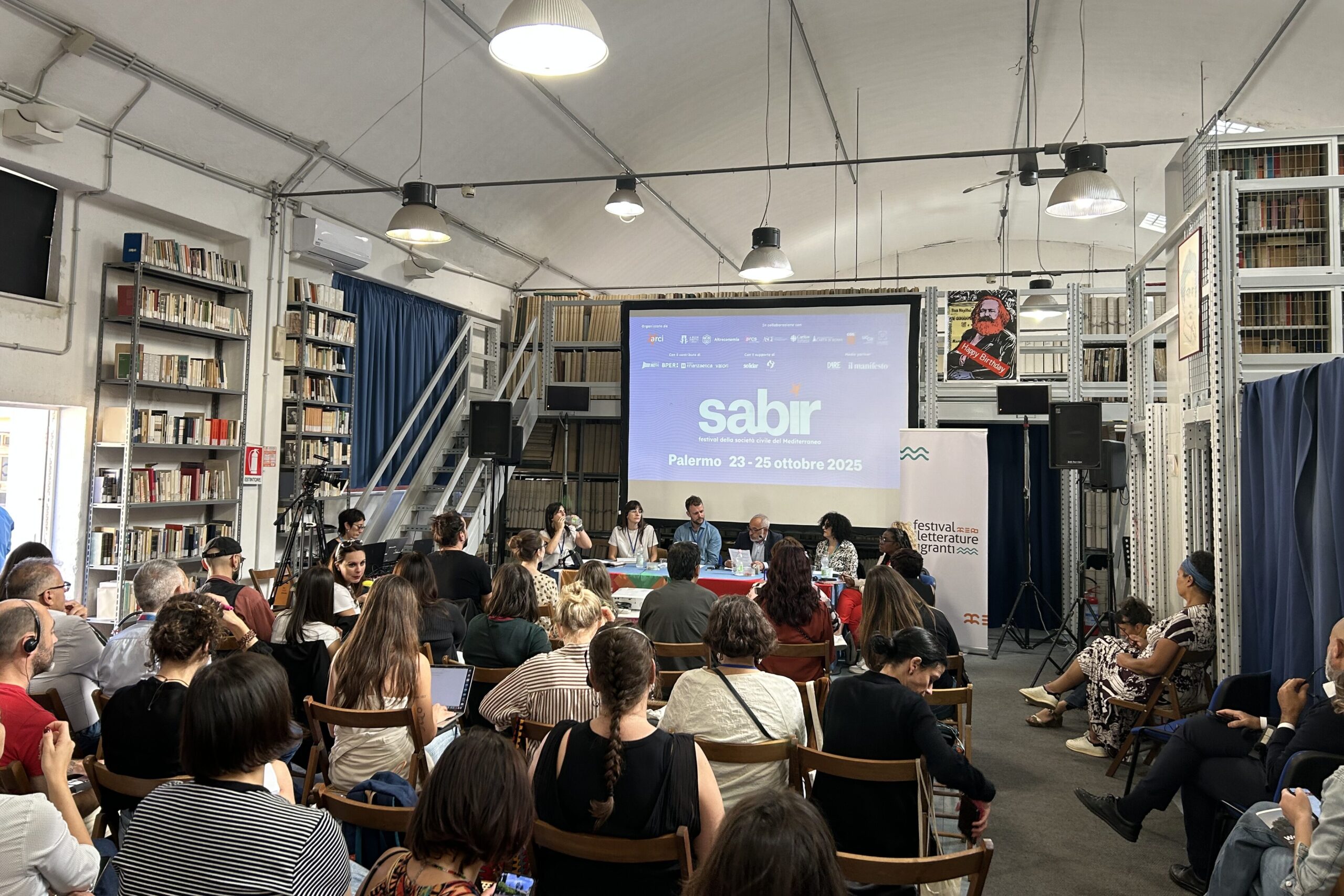SOLIDAR goes to SABIR Festival: our workshop on migrant workers’ labour exploitation
SOLIDAR and a delegation of members from across Europe joined Sabir Festival in Palermo, from 23rd to 26th October. Sabir is the Festival of Mediterranean civil society, exploring topics linked to migration, solidarity and fundamental rights, which has been organised every year since 2014 by SOLIDAR’s Italian members ARCI, in collaboration with CGIL and other national organisations.

This year, SOLIDAR contributed to the rich and interesting programme of the Festival with a workshop co-organised with our member CGIL. The workshop was titled “Borders and walls: a Europe open only to exploitation?” and focused on how restrictive migration policies, both at the EU and national level, fuel labour exploitation of people in a vulnerable situation, including migrants. SOLIDAR and its Spanish and Croatian members – MPDL and CPS – intervened as speakers.
SOLIDAR’s Secretary General, Mikael Leyi, opened the discussion by introducing the European Pillar of Social Rights (EPSR) and its Action Plan. He highlighted how they currently fall short in protecting migrants’ social rights and urged for the next Action Plan to overcome such weaknesses. He shared early findings from an upcoming SOLIDAR study that will identify barriers migrants face in accessing social rights and provide recommendations to close the “protection gap” and “justice gap.” Among the proposed solutions are limiting subcontracting chains, improving skills recognition, and ensuring access to free legal aid. He concluded by underlining the importance of cooperation between civil society networks and trade unions to help migrants unionise and defend their rights.
Bijou Nzirirane, Secretary of CGIL Palermo, discussed how Italy’s “Decreto Flussi” links migrants’ residence permits to their employment status, even requiring them to secure a job before arriving. This dependency fosters exploitation and empowers intermediaries who often charge high fees without offering proper administrative support. As a result, the decree risks increasing irregularity and precarity instead of reducing them.
Maria José Moreno, Legal expert at MPDL, brought to the discussion the example of Spain, illustrating the positive aspects of the current national law that expands the instances under which migrants can obtain a residency permit, decoupling it from an employment contract. In fact, there are five types of residence permits migrants can apply for, including regularisation processes, family reasons and socio-educational reasons. In her intervention, Maria José Moreno insisted on how protecting migrants from labour exploitation is not a generous gift but rather a matter of fundamental rights. Moreover, this also means protecting society as a whole by reducing the grey economy and strengthening the social protection system, as well as combating mafias.
Nicoletta Grieco, Head of the International Department of CGIL, presented the work of the Mediterranean and Sub-Saharan Migration Trade Union Network (RSMMS), which CGIL is part of. The Network has the objective of promoting social rights in the region, and it has recently created an internal working group on regularisation, which emerged as a priority among its members. Currently, the regularisation of migrant workers in EU member states is strongly limited, except for Spain. The Network will advocate for regularisation to be put back at the centre of migration and inclusion policies in the EU, going against the current political trend.
Sara Kekuš, Researcher at Centre for Peace Studies (CPS), analysed the recent changes in migration routes in the Western Balkans region, which led to a decrease in the number of arrivals to Croatia. She highlighted how this is the consequence of the externalisation of EU borders and pushbacks, now often occurring in neighbouring non-EU countries. Sara Kekuš also elaborated on the labour exploitation of migrants and the unsafe working conditions they are exposed to, which led to the death of six migrant workers in the country since the beginning of 2025. She also highlighted the problematic role of employment agencies, which are growing in numbers and resources, but are scarcely monitored and reportedly exacerbate the dependency of migrants on intermediaries, and therefore their vulnerability.
Maria Grazia Gabrielli, National Secretary of Filcams CGIL, described the security-focused approach that defines Italy’s migration policies, which are primarily shaped by limitations to the free movement of people rather than any other principle. She also flagged that emergency decrees have been widely used by the current government, also to produce laws in the field of migration, limiting the democratic scrutiny of the Parliament and increasing the securitisation approach. Finally, she highlighted the connections between migration and labour law and insisted on the need to expand the regularisation of migrant workers already living in the country.
On the same day, two other SOLIDAR members’ representatives – Milena Sosic for IDC and Susanne Drake for IFIAS – intervened in a panel titled “Solidarity under attack: control and authoritarianism in the Mediterranean region”. They reflected on the repression of environmental and students’ movements in Serbia and on the key role of strengthening democracy and solidarity with migrants in the future of the EU.

This activity was organised in the framework of the programme “Realising a Social Europe for All”, funded by the European Commission through the EaSI strand of the ESF+.

